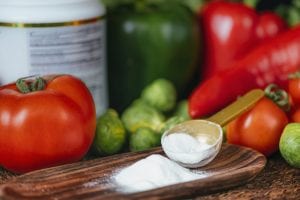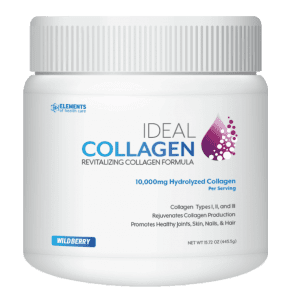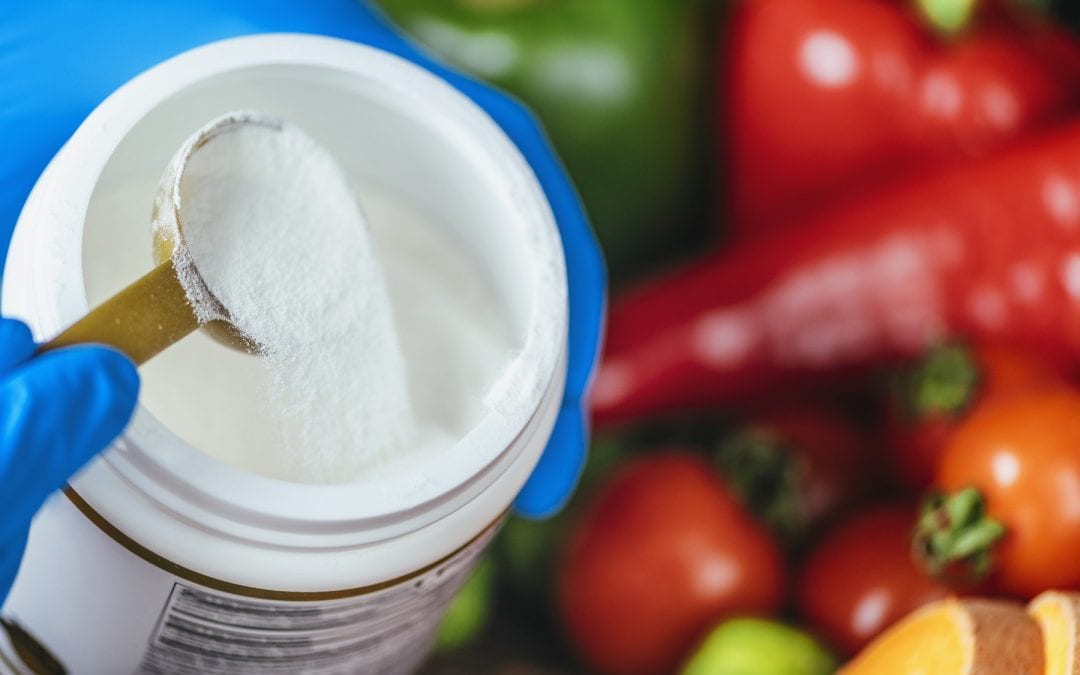Collagen supplements come in different shapes and sizes. They contain different collagen types, come in different forms, and sometimes have additional ingredients. So which collagen supplement is best? That will depend on why you are taking collagen in the first place. This guide will walk you through the different types of collagen supplements, and what you should look for to get the results you need.
What is Collagen?
 Collagen is a protein that is a building block in your skin, hair, cartilage, blood vessels, bones, and muscles. Your body produces collagen on its own, but collagen can also come from food—mainly animal-based protein.
Collagen is a protein that is a building block in your skin, hair, cartilage, blood vessels, bones, and muscles. Your body produces collagen on its own, but collagen can also come from food—mainly animal-based protein.
As we age, our bodies produce less collagen. This is one reason we get wrinkles, experience joint pain, and have weaker muscles and bones. People often supplement with collagen to try to counteract these processes.
Don’t misunderstand—the collagen you consume isn’t automatically transported to the desired area (like the skin or joints). But collagen supplements can give your body the building blocks it needs to produce more collagen. [1]
Types of Collagen
There are many types of collagen, but five that show up in supplements. Your body produces these different types of collagen for different parts of your body. Therefore, what you need can help you decide which type you should look for in a supplement.
Type I
Type I is the most abundant of all the collagen types. It is found in your skin, joints, blood vessels, bones, and various organs. It also helps make up fibrous tissues (think stiff tissues like cartilage) and may play an important role in wound healing and blood clotting. [2]
Most people take type I collagen to reverse effects of aging in the skin. In one study on collagen peptides, participants took a collagen supplement or a placebo for 12 weeks. Those who took the collagen had more hydrated and denser skin by the end of the study. [3]
Type II

Type II collagen is found in cartilage. Not surprisingly, type II is used to treat joint pain and arthritis. One study showed that chicken collagen was more effective than a placebo in easing joint pain in arthritis patients. [4] Another study showed that bovine collagen had a greater effect than other groups in treating joint pain, though the improvement was modest. [5]
It seems that chicken collagen is the most effective. A minority of supplements also use a collagen type called Undenatured Type II collagen (or UC-II). This is a chicken collagen that has not been broken down through high heat or chemicals. Some studies have found that it is even more effective than standard collagen for treating joint pain. [6] [7] [8]
Type III
This collagen is often found alongside type I, which is why supplements often combine the two. Type III collagen is made of reticular fibers that help make up your muscles and blood vessels. It is also thought to be essential in blood clotting. [9] [10]
Type IV
Types I, II, and III are more common in collagen supplements. Types IV is not as popular but is still out there. This collagen is one of the building blocks of the skin. It is especially abundant in the deepest layer of the skin (called the basal lamina) where the skin meets the body. [11]
Type IV also makes up kidney membrane walls and is important in filtering out waste from your body. [12] It may also be important for wound healing and in forming embryos. [13]
Type V
Type V collagen forms long, thin fibers. In the body, this collagen is found in the skin, hair, and the placenta. Because it helps form the placenta, type V collagen is important in neonatal development. The placenta is responsible for providing nutrients and oxygen to the embryo. [14]
Forms of Collagen Supplements
Another factor to consider is the form of the supplement. Some are more effective while others are more convenient. In the end, it will probably come down to your preferences.
Powder
 Powdered collagen is simply collagen that has undergone a chemical process and been converted to powder form. Then you simply mix the powder with water, juice, or a smoothie.
Powdered collagen is simply collagen that has undergone a chemical process and been converted to powder form. Then you simply mix the powder with water, juice, or a smoothie.
Some powders are hydrolyzed collagen, or collagen peptides. This is collagen that has been broken down into smaller particles. They tend to be more effective because your body can easily absorb it. Ideal Collagen is a great example of hydrolyzed collagen.
Capsule
These are not as popular as powder and creams, but you can still find plenty of them. Capsules can be an efficient way to get consistent daily doses. They are also more convenient—a simple swallow of a pill instead of mixing anything together. There is not enough research on collagen capsules to know for sure whether they are more effective than powder, so it may take trying it to know if it works well for you.
Cream

Collagen creams are not very effective for increasing the amount of collagen in the skin. This is because collagen molecules are simply too large to be absorbed into the skin. If you are looking to keep your skin elastic and wrinkle-free, a cream may not be your best choice.
However, collagen creams can be useful in some ways. They may be able to keep the skin moisturized and hydrated. They may also smooth wrinkles on the surface; just remember that it is only the top layer that is changing. [15]
Other
Other edibles, like gummies, are also available, but they have not been studied to see how effective they are. Like the capsules, you may have to simply try them for a while and see if they make a difference for you.
Other Ingredients
Collagen supplements are often accompanied by other ingredients to promote skin health, ease joint pain, or fortify bones and muscles. Depending on what you are looking for, you may find that a few extra ingredients can go a long way.
Glucosamine
 Glucosamine is a chemical compound found in your body that maintains healthy cartilage. Like collagen, as you age your body produces less of it. This can make cartilage break down. That is why glucosamine is often taken as a supplement to fortify joints. [16]
Glucosamine is a chemical compound found in your body that maintains healthy cartilage. Like collagen, as you age your body produces less of it. This can make cartilage break down. That is why glucosamine is often taken as a supplement to fortify joints. [16]
Chondroitin
Like collagen and glucosamine, chondroitin is a substance that is made naturally by your body. It is among the building blocks of connective tissues. People often take chondroitin along with glucosamine to relieve joint pain and improve mobility.
Hyaluronic Acid
This is a compound also made by your body, that is found mainly in the joints and the eyes. It can lubricate joints and moisturize the skin. However, most successful cases usually involve injecting hyaluronic into the skin or joint. Like various forms and types of collagen, you may have to try it out for yourself to see if it works for you.
Not every supplement has additional ingredients. Many collagen supplements are simply pure collagen—which may be exactly what you’re looking for.
The Bottom Line
 This guide is intended to get you started on your search for the right collagen supplement. Consider these points and weigh them with your needs. You may find yourself looking for a supplement that contains type II collagen and has glucosamine and chondroitin if you have joint pain. Or find a supplement with types I and III if you want healthier skin. It’s up to you!
This guide is intended to get you started on your search for the right collagen supplement. Consider these points and weigh them with your needs. You may find yourself looking for a supplement that contains type II collagen and has glucosamine and chondroitin if you have joint pain. Or find a supplement with types I and III if you want healthier skin. It’s up to you!
If you want both joint pain relief and healthier skin, check out Ideal Collagen. It contains 10,000 mg of collagen types I, II, and III. Other ingredients include glucosamine, chondroitin, and hyaluronic acid to promote joint relief and skin health.
Resources
- https://www.thehealthy.com/beauty/nail-care/collagen-pills/
- https://www.ncbi.nlm.nih.gov/pubmed/25941895
- https://www.ncbi.nlm.nih.gov/pubmed/26362110
- https://www.ncbi.nlm.nih.gov/pubmed/8378772
- https://www.ncbi.nlm.nih.gov/pubmed/8546737
- https://www.ncbi.nlm.nih.gov/pmc/articles/PMC2764342/
- https://www.ncbi.nlm.nih.gov/pubmed/12837047
- https://www.consumerlab.com/answers/does-uc-ii-help-joints/UC_II_undenatured_collagen/
- https://www.ncbi.nlm.nih.gov/pubmed/16464621
- https://www.ncbi.nlm.nih.gov/pubmed/11181090
- https://en.wikipedia.org/wiki/Collagen
- http://www.jbc.org/content/275/39/30716.full
- https://www.ncbi.nlm.nih.gov/pmc/articles/PMC3289483/
- https://www.ncbi.nlm.nih.gov/pubmed/8944612
- https://www.self.com/story/collagen-creams-supplements-skin
- https://www.mayoclinic.org/drugs-supplements-glucosamine/art-20362874
- https://www.webmd.com/diet/supplement-guide-chondroitin

